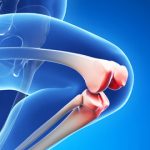(Reuters)—Drugmaker Regeneron Pharmaceuticals Inc. said on Monday its experimental drug to treat moderate to severe osteoarthritis pain was successful in a late-stage study.
The drug, fasinumab, was tested on 421 patients with a history of inadequate pain relief or intolerance to current painkillers. Fasinumab binds to nerve growth factor (NGF) proteins and block their activity, reducing pain.
After 16 weeks, patients given fasinumab reported less pain, as measured on the Western Ontario and McMaster Universities Osteoarthritis Index (WOMAC), than those given a placebo, Regeneron said in a statement.
“Overall incidence of adverse events, including serious and severe events, was similar across the fasinumab groups and placebo. As expected with antibodies to NGF, there was an increase in certain neuromusculoskeletal adverse events in the fasinumab treatment groups (17% combined fasinumab; 6% placebo), including arthralgia, paraesthesia, hypoaesthesia, and peripheral edema,” the company says.
The U.S. Food and Drug Administration placed fasinumab and other experimental agents targeting NGF on partial clinical hold in December 2012 after reports that animals treated with these drugs had nerve damage.
Fasinumab is no longer on clinical hold, according to Regeneron.



